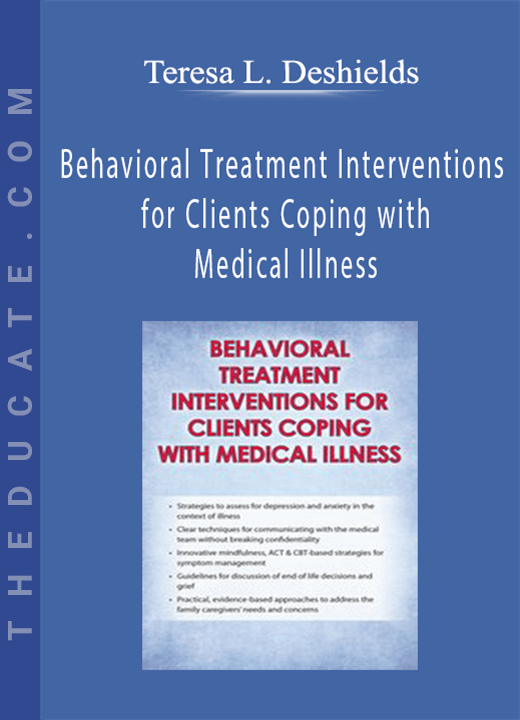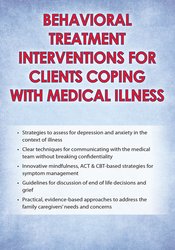Description
-
Teresa L. Deshields – Behavioral Treatment Interventions for Clients Coping with Medical Illness
- Faculty:
- Teresa L. Deshields
- Duration:
- Full Day
- Format:
- Audio and Video
- Copyright:
- Nov 14, 2019
- Address the psychosocial needs of clients coping with physical illness
- Assess for co-morbidity between mental health and physical conditions
- Motivate clients to undergo lifestyle changes to benefit their health
- Teach clients mindfulness techniques to cope with physical pain
- Process ever-changing thoughts and feelings related to illness
- Provide advocacy for your clients among their medical team
- Formal assessments to identify physical and emotional stressors
- How to ask “What do you think is wrong”
- The client who considers their problem only medical and isn’t open to behavioral interventions
- Setting a collaborative agenda
- Addressing quality of life concerns
- Distress
- Manifestations in medical populations
- Distress screening tools
- Balance efficiency with depth
- Identify changing feelings related to disease progression
- Depression
- Is it really “expected” after diagnosis of an illness?
- What to do when symptoms of disease overlap with signs of depression
- Measuring depression
- Cognitive-Behavioral Therapy interventions
- Creating balance with ACT
- Establish an integrated approach
- Anxiety
- Forms of anxiety that are particularly prevalent in medical illness
- Assessment measures
- Interventions when anxiety threatens tolerance for treatment
- Specific mindfulness and relaxation therapy exercises and scripts
- CBT tools to address worry and illness related anxiety
- Grief
- Strategies to address: “I’m not the same physically and emotionally …”
- Tools for releasing negative and obsessive thinking
- Working with the emotions and turmoil of Anticipatory Grief
- Addressing physical issues
- Motivational interviewing to help the client process lifestyle changes
- Self-management skill development
- Strategies to minimize symptoms
- Help the client determine the what and how of symptom relief
- Addressing pain with ACT
- Exercise recommendations for fatigue
- Increase the likelihood of adherence
- CBT for insomnia
- Mindfulness techniques for nausea
- The clinicians “tool box” for symptom management
- Ensure a wide array of options
- Determine the next step
- Quality vs. quantity of life
- Assessing patient preferences
- The difference between supportive, palliative, and hospice care
- Managing family disagreements related to treatment options
- What about family dysfunction
- Decision to withhold or withdraw care
- With clients
- Client-centered communication
- Breaking bad news with the SPIKES protocol
- With healthcare professionals
- Efficient but effective interprofessional communication with the SBAR method
- Sharing information without breaking confidentiality
- Challenges
- Sociodemographic changes & changes in medical care that make caregiving even more challenging
- Impact of the family caregiving on the caregiver’s health
- Caregiver psychological issues
- Prevalence of depression and anxiety in caregivers
- Relationship with client’s distress
- Financial toxicity
- Limitations of the research and potential risks
Description
Heart Disease, Stroke, Diabetes, Cancer, COPD, Arthritis and the list goes on…
Chronic illness has become rampant across the United States and no doubt it has made its way into your office. Many chronic conditions require people to undergo demanding, debilitating treatment and make incredible lifestyle changes.
Treating these clients comes with the challenge of addressing ongoing medical stressors and the accompanying depression, anxiety, and quality of life concerns.
Teresa Deshields, Ph.D., ABPP, knows first-hand how difficult it can be to navigate these challenges – she knows that treating these vulnerable individuals is serious work that demands a thoughtful, organized, and dedicated approach.
Watch her as she shares 20 years of experience treating clients with chronic illness in this compelling, practical recording.
You’ll learn specific strategies to:
This cutting-edge training will take your practice to the next level!
Handouts
| Manual – Behavioral Treatment Interventions for Clients Coping with Medical Illness (1.6 MB) | 107 Pages | Available after Purchase |
Outline
Establishing Whole Person Care
Psychological Distress in the Medically Ill
Behavioral Interventions for Physical Symptom Management
End of Life Considerations
Communication Issues
Family Caregivers
Faculty
Teresa L. Deshields, PH.D, ABPP Related seminars and products: 1
Teresa L. Deshields, Ph.D., ABPP, is a licensed clinical psychologist and clinical associate professor in the departments of medicine and psychiatry at Washington University School of Medicine in St. Louis. She is a Fellow of the American Psychosocial Oncology Society and its past-president.
She was the manager of the Siteman Counseling Service for the Alvin J. Siteman Cancer Center at Barnes-Jewish Hospital for 20 years. Her clinical practice is devoted to treating cancer patients and survivors and their family members, throughout the cancer continuum – diagnosis, treatment, survivorship, end of life, and grief. Her research is focused on issues related to psychological adjustment and quality of life in cancer patients and survivors.
Speaker Disclosures:
Financial: Teresa Deshields is a clinical associate professor at Washington University School of Medicine. She receives a speaking honorarium from PESI, Inc.
Non-financial: Teresa Deshields is a member of the American Psychological Association.







7 reviews for Teresa L. Deshields – Behavioral Treatment Interventions for Clients Coping with Medical Illness
There are no reviews yet.